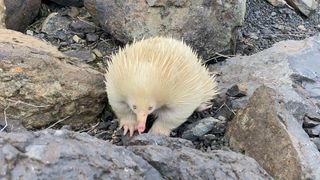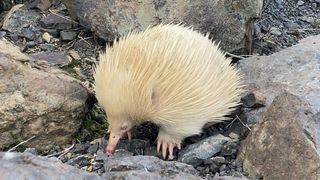Rarest of rare: 2 albino egg-laying mammals spotted in Australia
Echidnas are shy creatures, and even individuals without albinism are rarely seen in the wild.

Residents of New South Wales, Australia, have spotted two extremely rare albino echidnas in the space of just two weeks.
Geoff Hadley found one of the all-white, quill-covered creatures on a road in the Bathurst region, according to ABC News. He helped the echidna cross safely before reporting the sighting to local council officials, who revealed the animal in a social media post on May 1.
"Meet Raffie, Bathurst's rare albino echidna," Bathurst Regional Council staff wrote on Facebook. "We thought he is just too beautiful not to share, and particularly rare with only a handful of the egg-laying mammals, or monotremes, ever sighted in Australia."
Echidnas are one of two known mammals in the world (along with platypuses) whose females lay eggs but also produce milk. Short-beaked echidnas (Tachyglossus aculeatus) are common throughout temperate Australia and lowland New Guinea, while long-beaked echidnas (three living species belonging to the genus Zaglossus) only live in the highlands of New Guinea, according to the New South Wales Department of Planning and Environment.
Eleven days after the first sighting, Australia’s Wildlife Information, Rescue and Education Service (WIRES) published images and a video of a second albino short-nosed echidna that appeared to have been hit by a car and sustained minor injuries in New South Wales.
Related: Ancient platypus-like fossil could rewrite the history of egg-laying mammals

"This rare albino echidna, nicknamed Mr Spike, was released into WIRES' care recently after a suspected motor vehicle collision," WIRES staff wrote in a Facebook post on May 12. "Luckily he sustained only a few minor grazes and was given the all clear after a couple of days in care with local WIRES volunteers who then released him back into the bushland near where he was found."
Sign up for the Live Science daily newsletter now
Get the world’s most fascinating discoveries delivered straight to your inbox.
Albinism is a genetic condition that interferes with the body's production of melanin, the main pigment that colors animals' skin, fur, feathers, scales and eyes. Melanin is produced in cells called melanocytes; these cells are present but not fully functional in animals with albinism, making them appear partially or completely white.
Short-beaked echidnas that don't have albinism vary in color, from light brown in the hotter, northern regions to dark brown further south and black in Tasmania, according to the Department of Planning and Environment. Although they are widely distributed in New South Wales, echidnas are rarely seen in the wild due to their shy, reclusive nature.
"An albino echidna is a rare sight," Australia's Commonwealth Scientific and Industrial Research Organization (CSIRO) wrote in a Twitter post on May 22, 2022, alongside a video of another albino echidna that was found last year. "Spotting a non-albino echidna is also pretty uncommon," officials added.
Although it is difficult to determine exactly how rare albino echidnas are, John Grant, a spokesperson for WIRES, told ABC News that the rescue organization had cared for just three or four in the decade he's worked there.
Earlier this year, scientists solved the mystery of how echidnas beat the heat Down Under: The spiny creatures blow snot bubbles to keep their noses wet and cool. Quirkier still, males have four-headed penises and can ejaculate 10 times in a row without significant pause.
Bathurst Regional Council cautioned members of the public not to approach echidnas, as this could interfere with the creatures' natural behavior. "If you see Raffie out, please feel free to take a couple of snaps but do not approach, touch, or try and contain him," staff wrote in the Facebook post. "It is important to leave wildlife alone, as you could risk them losing their scent trail or leaving young unattended in the burrow."

Sascha is a U.K.-based trainee staff writer at Live Science. She holds a bachelor’s degree in biology from the University of Southampton in England and a master’s degree in science communication from Imperial College London. Her work has appeared in The Guardian and the health website Zoe. Besides writing, she enjoys playing tennis, bread-making and browsing second-hand shops for hidden gems.
